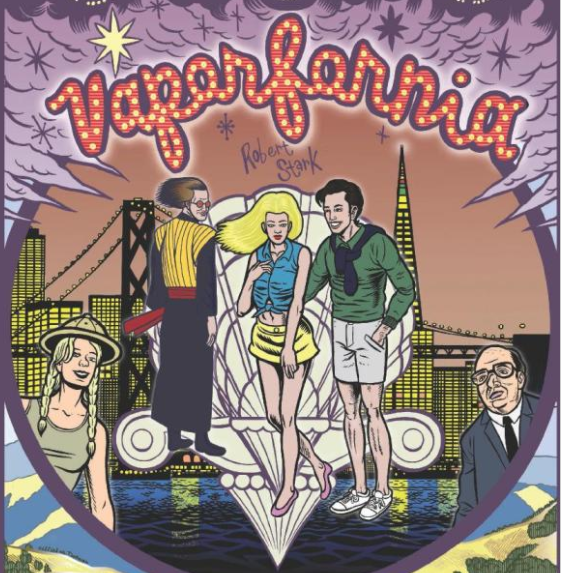Toby Sharpe's Twisted World
As an undergraduate at one of America’s mediocre universities
in the Midwest, I naively used to try to find secluded places on campus to
study, unaware that these also tended to be spots for homosexual cruising. Deep
in the bowels of the subterranean stacks of the university’s main library had
seemed like the perfect reading retreat, even if there were gross graffiti on
the desks like drawings of dicks and instructions to the effect of “tap foot three
times for blowjob”. I finally had to give up on these isolated recesses of the
library, however, after a pudgy, grubby-looking flutterer in gym shorts had
done a walk-by a couple of times and given me an unsavory smile. Then I tried
an alcove of the student union building, deserted on a Saturday night. I
remember having the area to myself, with James Joyce’s Ulysses, the
Harry Blamires guide The New Bloomsday Book, and probably a dictionary spread
out on a table, trying to do some serious work, when I became aware of another
person behind me. An older, balding man entered the alcove and sat at the table
directly behind me. It made me uncomfortable, but I was doing my utmost to
block out my surroundings and concentrate on the challenging text in front of
me. Gradually, however, I noticed the man’s heavy breathing, which turned to
grunting and finally unzipping, at which point I panicked and hastily stuffed
my books back into my bag and vacated the premises as quickly as possible. Not
long thereafter, I thought I saw this same man on a sidewalk, bringing his hand
to his face as if in shame as he passed me. Dressed in a suit and carrying a
briefcase, he looked like he was probably a professor. My memories of these
events, indicative of a seedy underside to university life, returned to me
recently as I was reading Matthew Pegas’s 2021 novel Dragon Day.
Pegas, a frequent collaborator of Stark Truth podcaster
Robert Stark, has written a structurally complex debut novel, utilizing a pseudo-semi-omniscient
narrator to tell the story of Toby Sharpe, a socially inept undergraduate studying
literature at Lockden University, a fictitious institution inspired by Pegas’s
alma mater Cornell. Toby, a character with a whiff of Elliot Rodger about him,
hopes to be accepted into Lockden’s intellectually oriented and left-activist society
Yellow House to be close to Zoe, the blonde beauty he believes he deserves.
Telling Toby’s story and creatively probing his thoughts while “working with […]
scattered impressions” is Charles, a homosexual Yellow House resident and
assistant to charismatic English professor Thomas Wallingford. Much of the book
is concerned with uncertainty: Toby’s uncertainty as to whether Wallingford, a
mysterious figure who both attracts and repels him, is the man who assaulted him
in a gym; students’ suspicions that highly respected scholars are actually full
of shit; and, ultimately, the reader’s questions as to how reliable or fanciful
Charles’s narrative is. Early in the novel, Toby’s acquaintance Shiv wonders
aloud, “I don’t understand why people bother eating lettuce […] There’s
literally like nothing in lettuce.” Toby counters with one of his vegan mother’s
factoids about the valuable protein content of lettuce, but privately ponders
along these lines: “The truth about whether it was worth eating lettuce was out
there, but for the moment, he didn’t know who to trust: his well-researched
mother or his gym-built suitemate, each of whom seemed as serious about their
body as the other.” This episode presents an innocuous expression of the fog of
information war that spreads and intensifies at Lockden as radical students
become more strident and Alt-Right ideas begin to haunt the collective
imagination of the campus.
Pegas’s characterization of homonormie student Charles
discovering the Alt-Right online in the period just before Donald Trump’s
ascendancy is amusing, with the seeker unironically consulting SPLC resources but
also becoming fascinated by the variety of taboo micro-ideologies, like
Homonational Bolshevism, that have sprung into being to contend for young
intellectuals’ loyalty. Toby, whose seduction by a hodgepodge of ideas drawn
from Nietzsche, Crowley, and possibly also Jack Donovan, is motivated largely
by resentment over sexual rejection. Reviewer T.R. Hudson has dubbed Dragon Day “the Incel’s Bildungsroman”, and nationalist readers may take umbrage
at what is arguably Pegas’s conflation of the dissident right with sexual aberration.
The racial component of Toby’s alienation is understated, however, and comes
across as an afterthought. The author is much more interested in Toby’s social
awkwardness, and scenes of his painful and off-putting interactions with peers
are nicely drawn. The antihero’s encounters with Zoe and with sexual rival Ronnie,
an academically and socially successful wigger with buck teeth, are generally
lively, and I wish there had been much more of this material in the book, along
with further exploration of Toby’s distaste for foreigners. What prevents Dragon
Day from truly being “the Incel’s Bildungsroman” – a label more appropriately
applied to Stark’s The Journey to Vapor Island – is the puzzling
lack of background information on Toby. I would expect a Toby to harbor a hellish
reservoir of resentments and traumas from high school or childhood humiliations,
but Charles’s version of Toby’s villain origin story is oddly abrupt and only
seems to begin with the character’s arrival at Lockden. Nearing the end of Dragon Day, I found myself wishing that Toby’s mother or Toby himself had left a
record of his life story to complement Charles’s abbreviated account, which
feels somewhat like reading one third of a novel. Dragon Day, as it
stands, is a promising debut fiction to tickle the scrotum with unease, but I
wanted there to be more of the protein-packed lettuce portions of it
that I enjoyed.
Rainer Chlodwig von K.
Rainer is the author of Drugs, Jungles, and Jingoism.




Comments
Post a Comment